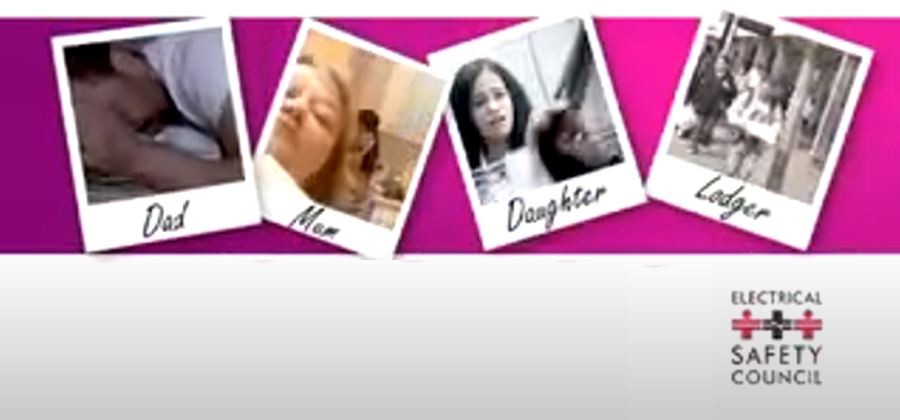The video below - made by ESC via, Electrical Safety - presents a family and their "normal daily activities", with the electrical hazards that can come up in the course of doing things.
Over 50% of people don't know what an RCD is, but it could save your life!
We have transcribed some of the text and added some more - useful advice and electrical safety tips for home!
Let's see, for example the Watts family: Dad David, Mom Elaine, Daughter Ally, and the new lodger, Ian. This video presents their stories and you can spot several electrical hazards that could happen... which you may also recognize in your own home!
Counterfeit products can kill! Counterfeit kills!
For your own personal safety and for the safety of others, you have to buy electrical items from a reputable source - counterfeit products can kill! Counterfeit kills!Yes, many of these devices look good and perform well, but there's a great chance that some of these items you purchase over the internet or from market stores would be faulty or counterfeit.
Why risk your own life or the life of the ones in your house when you can purchase electrical items / devices from reputable sources? "There are instances where doggy goods can cause fatalities"
Always use correct adaptor for the appliance
Forcing the wrong plug or adaptor into a socket is very dangerous and can lead to electric shock or fire."The dangers of forcing a two-pin plug into a three-pin socket are that a two pin plug does not have a fuse and for the UK electrical system you need to have a fuse with the plug and without the fuse it could overload and catch fire."
Also, there is no protection should there be a fault on the cord or with the device - the two pin plug does not have an earth and it could lead to an electrical shock to the user of that piece of electrical equipment!
Beware of cables buried in the walls when carrying out DIY!
Walls and partitions conceal electrical equipment as well as water pipes.A cable detector will help identify the presence of concealed cables, but if in doubt you can ask for professional advice from a qualified electrician.
Particularly with the electrical cables, they are hidden in the wall and they run to the electrical socket.
First of all, even for a simple setting up a painting or a picture frame on the wall, check whether there is a socket outlet right below the place where you want to set it. It is good to take precautions when putting a nail in a wall - instead of risking death while doing something as simple as this!
Hanging clothes over heaters is a fire hazard!
If you cover the ventilation slots on a heater it could cause it to overheat and catch fire! Even though it may seem simple to just "put your clothes on the heater", if you cover the ventilation slots of the heater with your clothes, they not only are in danger of being "fried" but also the heater can catch fire.
An RCD is a life saver - make sure you always use an RCD when using electrical equipment outdoors!
An RCD is a safety device that switches off electricity automatically when it detects an electrical fault.Remember to plug your gardening equipment and your power tools into an RCD protected socket. The situation presented in this video may "look funny" and "ridiculous", but you will be surprised of how easy it is for such a scenario to happen even in your own backyard!




